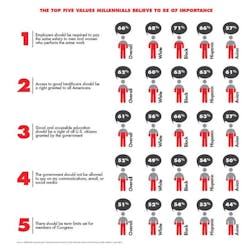There’s been a tremendous amount of discussion regarding the millennial generation and their impact on the trucking industry – both good and bad – for a long while now, if for no other reason that they now make up the primary labor pool from which motor carriers will increasingly draw truck drivers, maintenance technicians, and dispatchers, among other personnel.
Though smaller in size than the 77 million “Baby Boom” generation they are helping replace, millennials will require – if not demand – new managerial approaches that might differ greatly from past practices.
I’ve touched on more than a few millennial-related topics before in this space for that very reason and plan to do so here again in reference to a new survey dubbed Millennials Deconstructed compiled by Richards/Lerma and The University of Texas at Austin’s Stan Richards School of Advertising & Public Relations.
This survey polled some 1,000 millennials aged 18 to 34 across “multiple ethnicities” – White, Black, Hispanic, and Asian – and unearthed both surprising and unsurprising details.
For example, on the “I already knew that” front, millennials maintain more “liberal views” of the world today, with this poll determining that these “top five” values are shared pretty consistently across U.S. ethnic groups:
- Employers should be required to pay the same salary to men and women who perform the same work.
- Access to good healthcare should be a right granted to all Americans.
- Good and accessible education should be a right of all U.S. citizens granted by the government.
- The government should not be allowed to spy on communications, email, or social media.
- There should be term limits set for members of Congress.
Now, while those “common views” may not surprise a lot of folks in trucking, the differences expressed among the ethnic groups within the millennial generation are pretty eye-opening, if you ask me. And, remember, 44% of the U.S. millennial cohort is made up of ethnic minorities – the highest percentage to date:
- Hispanic millennials are more likely to believe the U.S. should require labeling of genetically engineered foods.
- White millennials are significantly less likely to support the Patient Protection and Affordable Care Act, commonly known as “Obamacare.”
- Asian millennials are less apt to support the legalization of marijuana.
Another big surprise from this poll: Hispanic millennials maintain the “greatest sense of American pride” compared with other ethnicities, with 54% stating that they are "very proud" of being American despite being the least likely cohort to have a long lineage of heritage in the U.S.
By contrast, White millennials – who are more likely to have many generations of American heritage – have the lowest levels of national pride at only 40%, while some 50% of African-American and Asian millennials agree with the “very proud” statement.
The survey also found a lot of discontent with the current political system as well. Of all the millennial ethnic groups, Whites have the lowest perception of the current system, with “a mere 18%” believing the current system is "good" or "excellent," compared with more than a quarter (27%) of Hispanic millennials and one-third (33%) of Black and Asian millennials, the poll found.
[That may be why approximately 16%, or an estimated 6 million millennials, don’t plan on voting in the 2016 Presidential Election, at least according to the survey’s responses.]
Finally, in terms of the “big issues” on the minds of millennials, many mirror the concerns expressed by the older Generation X and Baby Boomer cohorts.
For example, the survey found that "the economy" is ranked by 50% of millennials as the “leading issue facing the country today,” followed by "terrorism and national security" at 47%, "debt and spending" at 43%, "race issues" at 43%, and "gun control" at 42%.
Collectively, millennials are less concerned about abortion, same-sex marriage, and foreign policy, the poll found.
All of that is certainly interesting grist for the trucking’s recruiting and retention mill, mayhap helping motor carriers better tweak their job outreach efforts.




